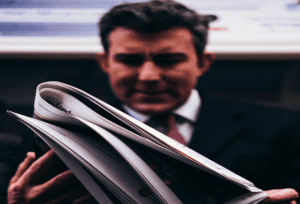10 ways to handle headline anxiety
“Doom-scrolling” is becoming a habit right now. No sooner had we learnt to live with the pandemic than the long-dormant inflation dragon started to breath fire anew. Now, another remnant of a forgotten past — war in Europe — has returned to put us on edge. As an investor, how should you respond to all this uncertainty? Here’s a ten-point guide to handling headline anxiety.
- Recognise the stress you are feeling. There is no denying that the situation in Ukraine is worrying. Put aside the geopolitical and market debates. The bottom line is that innocent people are suffering. You wouldn’t be human if this did not shock and appal you. So make room for that emotion without judgement.
- Don’t magnify your anxiety by doom-scrolling. Yes, it is fine to keep up with the news, but scary headline after scary headline is bound to have an impact on you. Just because you have access to real-time coverage 24/7 via your device doesn’t mean you have to be constantly plugged in. You need to give yourself time for processing, recharging and focusing on things you can control.
- If you feel helpless, think about practical things you can do at multiple levels — as a citizen, a consumer or investor. That could include contributing to a humanitarian fund or cause, joining boycotts, supporting refugees, writing to your local MP or avoiding funds with large exposures to Russia.
- As an investor, accept that uncertainty goes with the territory. Volatility tends to rise as uncertainty increases. The point is there is little to be gained by second-guessing markets. That’s because all the available news information is already reflected in prices. It’s what happens nextthat counts and nobody knows that.
- Reflect on the fact that many major geopolitical shocks have occurred in history and in each case markets have eventually recovered, usually within months. This includes the Second World War, Korean and Vietnam Wars, the end of the US dollar’s link to gold in the early 1970s, and 9/11 and its subsequent wars.
- Remember that risks can go either way. Markets will often price in worst-case scenarios and then bounce back dramatically if events go better than what is priced in. We saw that after the initial shock of the pandemic in March, 2020. This is why maintaining a measured response as an investor is so important.
- Seek support. Don’t try to deal with it all on your own. A friend or counsellor may be able to help you on the human level. A trusted adviser can help talk you off the ledge and bring you back to the proven virtue of having a structured financial plan, one that accommodates the prospect of extreme events.
- Draw up a balance sheet — external stuff you can’t control on one side (geopolitics, market moves, economic changes, headlines) and the stuff you can control on the other (your media habits, diversification, exercising discipline, keeping access to cash, seeking help). The second list is the one to focus on.
- In every situation like this, keep reminding yourself of one simple, but critical phrase containing just three words: “This won’t last.”Think about it. Nothing lasts. Change is part of what it means to be human. It applies to good and bad events. And accepting that can make it easier to deal with these times.
- Find solace in the great philosophers and thinkers. Psychiatrist and holocaust survivor Viktor Frankl wrote that there will always be suffering. It is how we react to suffering that counts. The true test of our character — as human beings, as citizens, as investors — is in how we act. This is your opportunity.
This advice may not be suitable to you because it contains general advice that has not been tailored to your personal circumstances. Please seek personal financial and tax/or legal advice prior to acting on this information. Before acquiring a financial product a person should obtain a Product Disclosure Statement (PDS) relating to that product and consider the contents of the PDS before making a decision about whether to acquire the product. The material contained in this document is based on information received in good faith from sources within the market, and on our understanding of legislation and Government press releases at the date of publication, which are believed to be reliable and accurate. Opinions constitute our judgment at the time of issue and are subject to change. Neither, the Licensee or any of the Oreana Group of companies, nor their employees or directors give any warranty of accuracy, nor accept any responsibility for errors or omissions in this document. Gordon Thoms and David Conte of Calibre Private Wealth Advisers are Authorised Representatives of Oreana Financial Services Limited ABN 91 607 515 122, an Australian Financial Services Licensee, Registered office at Level 7, 484 St Kilda Road, Melbourne, VIC 3004. This site is designed for Australian residents only. Nothing on this website is an offer or a solicitation of an offer to acquire any products or services, by any person or entity outside of Australia.

